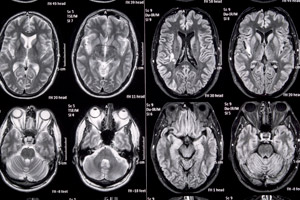
The Basics
Wernicke’s encephalopathy, also known as Wernicke’s disease, occurs when tissue abnormalities called lesions appear in certain parts of the brain. Symptoms found in people affected by this condition include a potentially progressive loss of mental clarity, muscle control problems that manifest in the legs, double vision and a form of uncontrolled eye movement known as nystagmus. In most cases, the symptoms of Wernicke’s encephalopathy eventually give way to the symptoms of Korsakoff syndrome, which can include such things as tissue destruction in the parts of the brain responsible for storing and using memories, distortion or complete fabrication of memories, a decline in self-awareness and visual or auditory (sound-based) hallucinations. Potential consequences of Wernicke-Korsakoff syndrome include permanent damage to the brain’s memory centers, permanent damage to the brain’s logical processing abilities, loss of responsiveness or consciousness, and premature death.
Thiamine Deficiency
Thiamine deficiency, also known as beriberi, is the underlying cause of both Wernicke’s encephalopathy and Korsakoff syndrome. It sets in when a person’s diet doesn’t contain enough vitamin B1 to meet his or her ongoing needs, or alternately, when a person can’t make proper use of an adequate vitamin B1 supply in his or her diet. Beriberi comes in two main forms, known as wet beriberi (which alters normal function in the heart and blood vessels) and dry beriberi (which alters normal function in the nervous system). People affected by Wernicke-Korsakoff syndrome have dry beriberi. In addition to the brain changes associated with the syndrome, common symptoms of dry beriberi include vomiting, a reduced ability to feel anything in the feet or hands, nerve-related body tingling, paralysis below the knee and pain in various body areas.
Alcoholism and Wernicke-Korsakoff Syndrome
People who drink enough alcohol to trigger alcoholism commonly have problems meeting their bodies’ needs for thiamine. This is true, in part, because alcoholics commonly substitute drinking for proper food intake. It also stems from the fact that high levels of alcohol disrupt the body’s natural ability to take in and utilize the thiamine content in various foods. However, people unaffected by alcoholism also develop thiamine deficiencies, as well as cases of Wernicke-Korsakoff syndrome. In the study published in Alcoholism: Clinical & Experimental Research, the University of North Carolina researchers attempted to find out if the presence of alcohol in the brain adds a separate risk factor for Wernicke-Korsakoff in people affected by alcoholism. They did this by examining several groups of mice in a laboratory setting. Some of these mice had a thiamine deficiency but were not exposed to alcohol; others were exposed to alcohol but did not have a thiamine deficiency. Another group of mice had thiamine deficiencies and were also exposed to alcohol. In addition, the researchers examined a fourth group of mice unaffected by either thiamine deficiency or alcohol exposure. After comparing the four groups of mice, the researchers concluded that the mice subjected to both thiamine deficiency and alcohol exposure for five days showed signs of more extensive brain damage than the mice only subjected to thiamine deficiency. After coming to this conclusion, they took steps to track down the specific brain changes that contribute the unique effects of alcohol. They found that the presence of alcohol appears to worsen the impact of thiamine deficiency by altering the function of certain genes that help control the immune system.
Significance and Considerations
The authors of the study published in Alcoholism: Clinical & Experimental Research concluded that active alcoholics apparently experience a worsening of the baseline impact of thiamine deficiency that leads to serious damage in one key area of the brain associated with the onset of Wernicke-Korsakoff syndrome. They believe that this finding helps explain precisely why the syndrome is so likely to appear in people affected by alcoholism.
